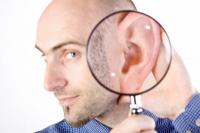Water softener for the washing machine
In many households, calcification from hard water is a well-known problem that needs to be addressed. Faucets and kettles need to be descaled regularly and special water softeners are often added to the washing machine to protect them from calcification. But what do these water softeners actually do and are they really always necessary? How to use water softeners for the washing machine correctly and sensibly.

What you need:
- water softener
- Information about the water hardness level in your area
What is "hard water" actually?
Water is called "hard" if it has 14 degrees of German hardness (° dH) or more. This describes the proportion of dissolved calcium and magnesium ions in the water. This can be high near the Alps, for example. When the dissolved calcium ions are heated or come into contact with soaps, they eventually fall as lime the end.
Water softeners interact with dissolved calcium and magnesium ions in the water. As a result, these ions can no longer form lime soaps with the detergent, which reduce the washing effect and can gray the laundry.
When and how to use water softener
- Whether and how much water softener you should use depends on the hardness of the water in your region. You can easily find this out from your municipality or city administration.
- Most detergents already contain water softener, so that an additional addition is unnecessary with low to medium water hardness. A table on the back shows you how much detergent you need for soft or hard water.
- With hard water, i.e. from 14 ° dH, it is advisable to add small amounts of water softener to the wash cycles. On the one hand, it improves the washing effect and, on the other hand, it protects yours Washing machine from limescale deposits. It is best to dose this according to the manufacturer's instructions.
- When softening water, “as much as necessary, as little as possible” applies! Although the sewage treatment plants filter the water better and better and use phosphate-containing water softeners, which without sufficient filtration for the eutrophication of Contributing to bodies of water, have meanwhile been displaced, the excessive use of water softeners still leads to an unnecessary number of chemicals Water. So an overdose is not only pointless, but also harmful. For example, the dosage of the water softener does not depend on the temperature at which you wash, but on the hardness range of the water or if you do not use a water softener but only detergent, it also depends on the degree of soiling of the laundry.
- One way to correctly dose detergent and water softener for hard water is to separate them. You should buy detergents that do not contain water softeners. This means you can be sure that you will not overdose on the water softener. Conclusion: water softener for hard water, yes, but taking into account the dosage information.
Tabs, powder or liquid detergent - the choice is large and makes dosing ...
How helpful do you find this article?

